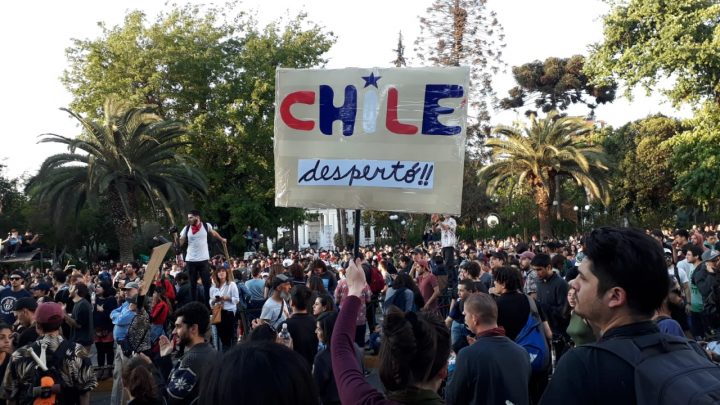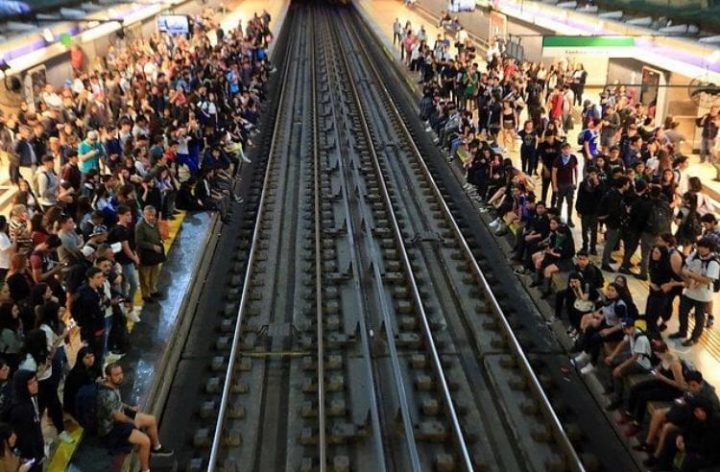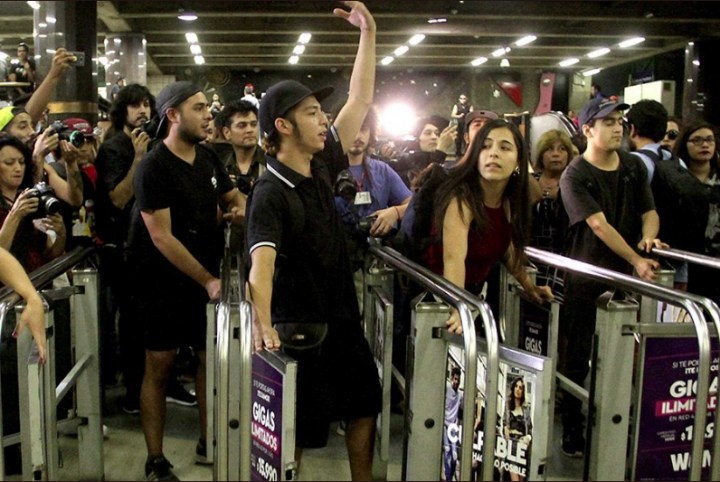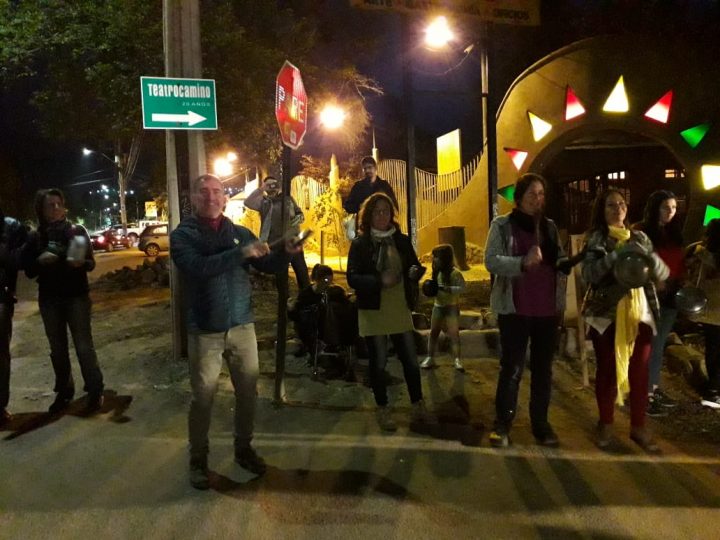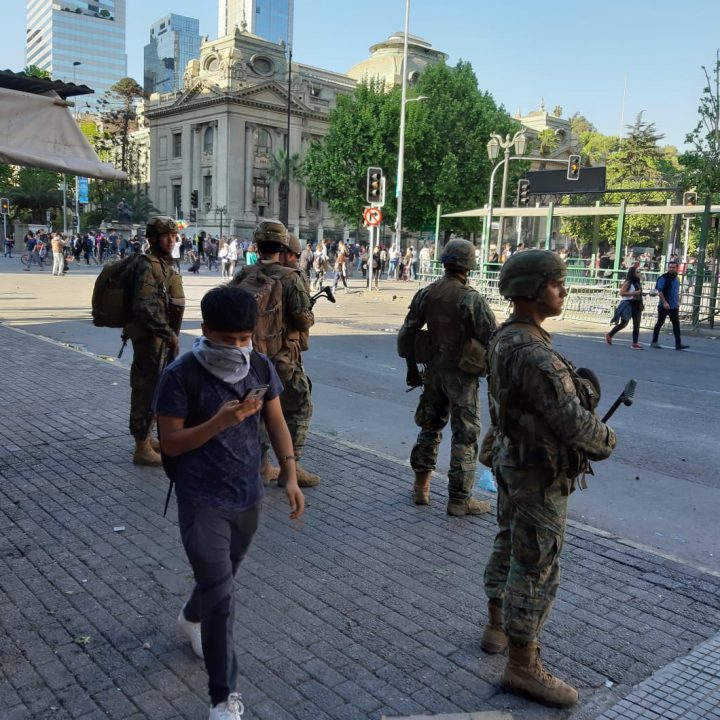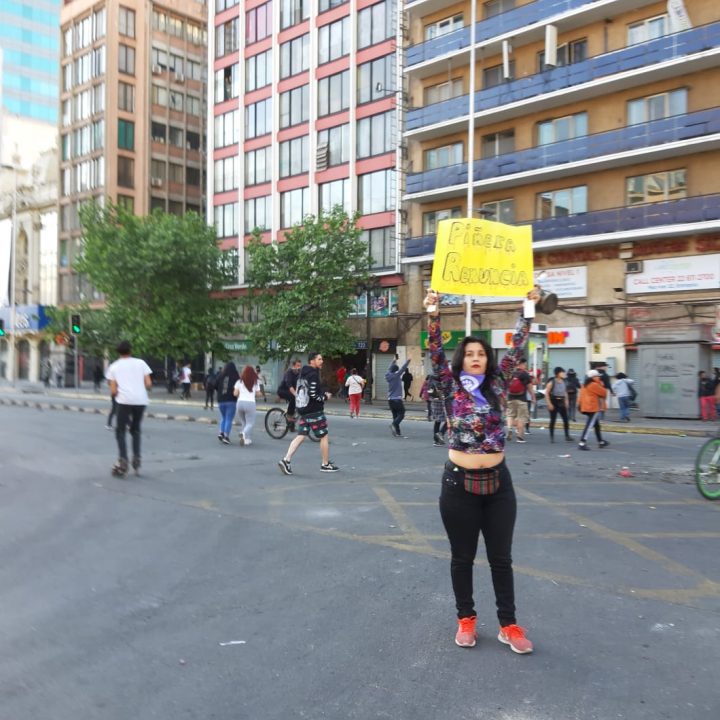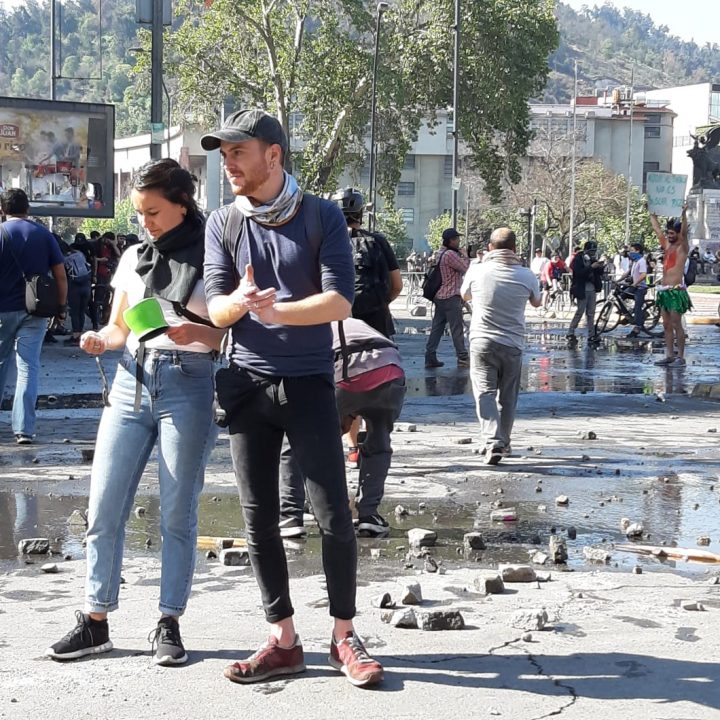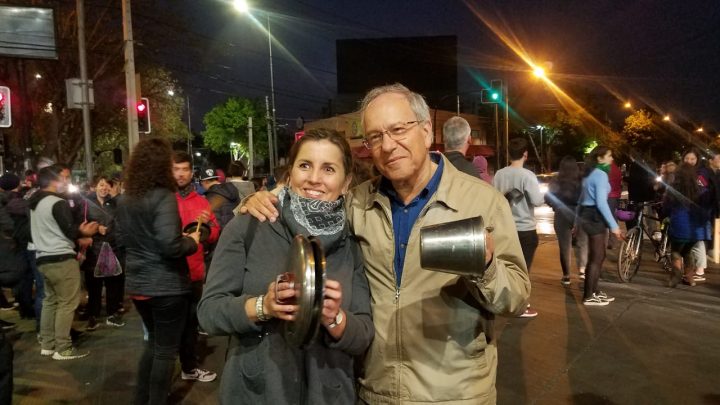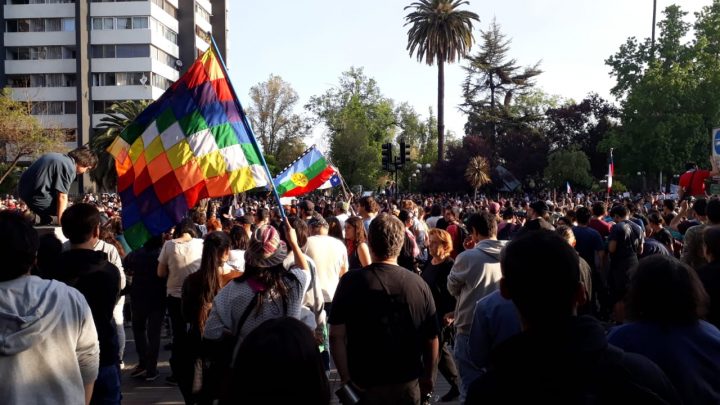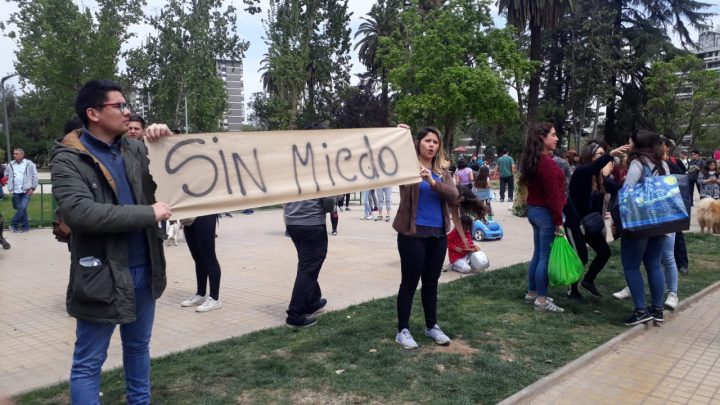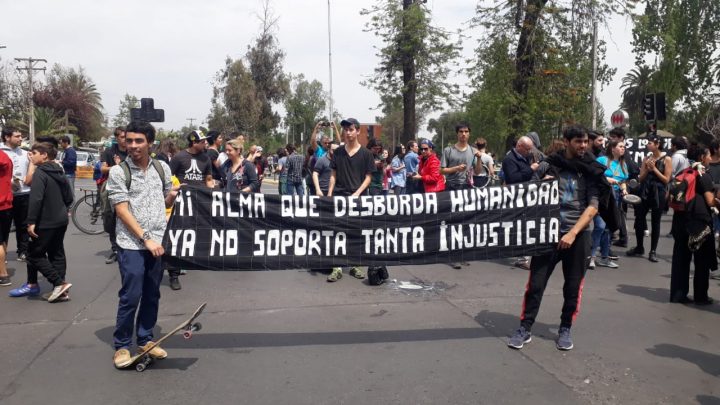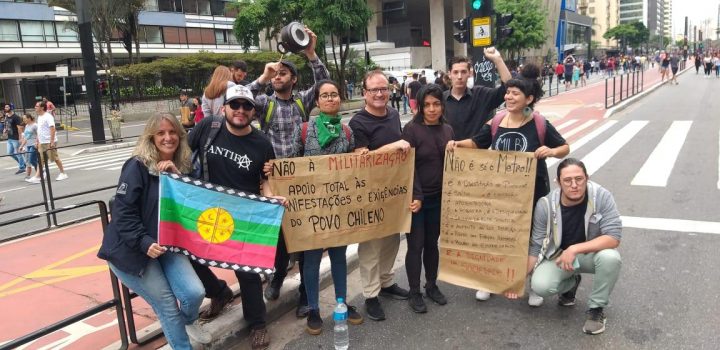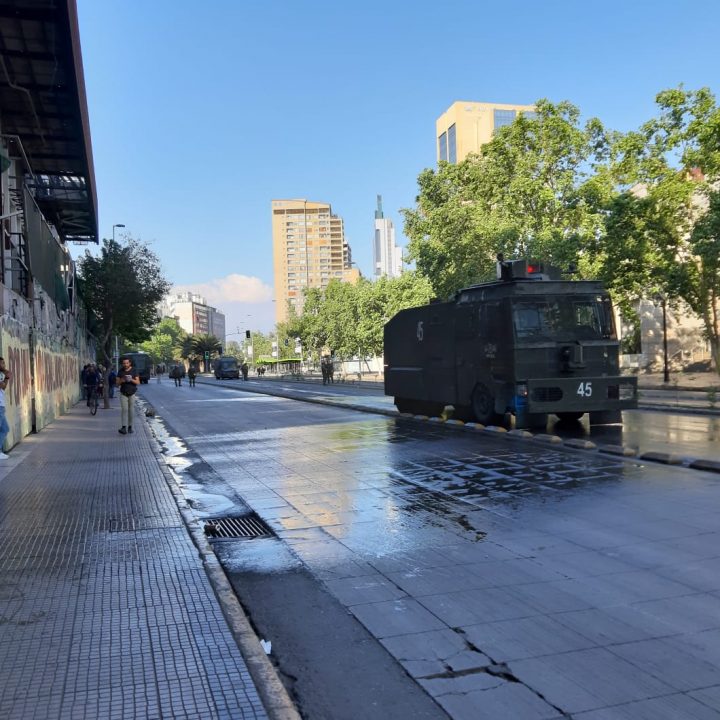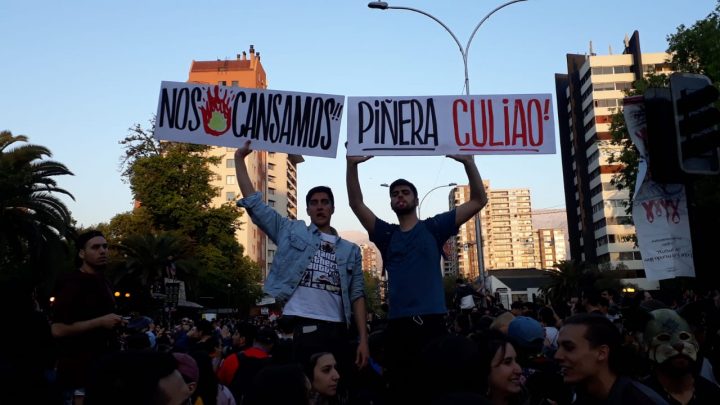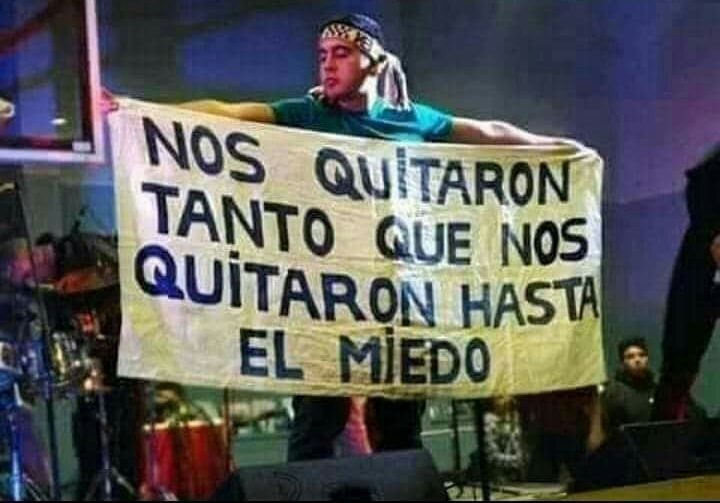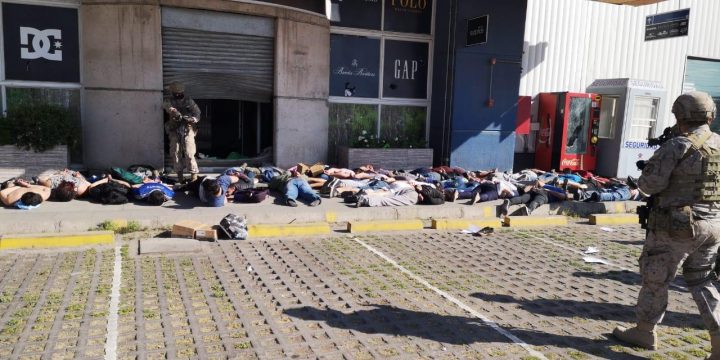“It’s not 30 pesos, it’s 30 years” is a slogan that was repeated Sunday in many social networks and protesters banners who continued to go to the streets throughout the country. “30 pesos” refers to the rise of Santiago Metro ticket, that blew up the pressure experienced by Chilean people. 30 years refer to the decades since the end of the military regime and the betrayal that meant that pro-democracy parties deepened the economic model imposed by the dictatorship, rather than making substantive changes.
Defying the curfew that started at 19.00 hours, last night demonstrations were carried out with banging pans and car horns in many parts of the capital and numerous cities in regions. In Santiago, people went out to protest at the main intersections, even in traditionally high-class sectors, such as La Dehesa or Las Condes.
There were also suspicious looting of supermarkets (Leader, Jumbo, Santa Isabel), shopping centers, warehouses (Kayser), pharmacies (Ahumada, Cruz Verde), gas stations (Copec), some municipalities (Lo Espejo), bottling plants (Coca-Cola) and toll booths in the capital. Some sectors, such as Puente Alto, have suffered power and less pressure in water supply. In Valparaíso, Bellavista station of the local city train (Merval), and the first floor of El Mercurio newspaper was razed by the flames. Repression was particularly harsh in that important port city, since the Navy, a traditionally conservative military branch, sits there. I say “suspicious” because it cannot be ruled out that these lootings, at least the most striking, are a police staging to divert attention and criminalize the protest, which until now has been mostly peaceful.
Throughout the day there were demonstrations all over the country: the sound of pans and honks became almost a backdrop. While in Ñuñoa Square there was a festive atmosphere that brought together some 3,000 people (although by 9:00 p.m. there were already barricades with bonfires), the peaceful march from Plaza Italia to La Moneda suffered a strong police and military repression, with “guanacos”(pressurized water cars),“zorrillos”(closed vans) and tear gas bombs, despite which protesters remained in place, some peacefully and others barricading and throwing stones. In Alameda with Santa Rosa, next to the National Library, there were skirmishes between protesters and special forces of Carabineros. There are videos of mass demonstrations in Arica, Iquique, Antofagasta, Rengo, Rancagua, Concepción, Temuco, Punta Arenas and many more. As the curfew approached, police began firing pellets and rubber pellets at the protesters. There are reports of 2 deaths from gunshot wounds in the northern city of La Serena and another 5 in a fire in the capital city of Renca. The state of emergency extended today to communes of different regions, such as Concepción, Rancagua, La Serena and Valparaíso.
In the capital, most of the communes (municipalities) suspended classes for Monday. The Teachers Union (Colegio de Profesores) called not to attend educational centers due to lack of transportation or minimum guarantees for students, and demanded from the government an end of the state of exception and the creation of a new mechanism that controls the readjustment of basic service fees.
Abroad, this social outbreak has received ample news coverage, especially since Friday, but its ultimate causes have not always been covered. Several people, both Chilean and local, have expressed their support with demonstrations in front of the Chilean consulates in Sao Paulo, Barcelona, Berlin, Munich, Dublin, Mendoza, Buenos Aires and even in massive musical concerts, as in Honduras.
Santiago airport canceled and rescheduled most of its flights, and several interprovincial bus companies (such as Tur Bus) closed their services until further notice.
So far there have been confirmed 11 dead, 625 arrested in the Metropolitan Region and 91 in regions, and at least 244 arrested for a curfew violation, and it is expected that these figures will rise tonight.
National Institute of Human Rights (NHRI) reported allegations of excessive use of force, ill-treatment of children, sexual harassment and torture against detainees in the 1st, 3rd, 21st, 19, 25, 33, 43 and 48th police stations of Carabineros in Santiago.
Santiago Metro expects to operate partially this week on Line 1 (the oldest), but estimates that others (such as 4) could take months to be repaired.
For tomorrow, Monday 21, various organizations, such as CONFECH (Confederation of Students of Chile), FECH (Federation of Students of the University of Chile), ANEF (National Association of Fiscal Employees), among many others, have called for a day of national protest in demand of just and affordable transportation.
Reactions from the political and cultural world
A video circulated in the networks in which numerous artists, such as Camila Moreno, Fernando Milagros, Manuel García, Magdalena Matthey, among others, rejected the measures imposed by the government. Mon Laferte tweeted: “Let the world know that you are a dictator who gives orders eating pizza in the upper neighborhood” (referring to the fact that in the middle of the crisis Piñera was in a family celebration). Many other personalities of culture, such as theater director Alejandro Goic, and sports, such as soccer players Gary Medel and Claudio Bravo, made statements in the same direction.
The president of the Teachers Union, Mario Aguilar, said in a video: “We have to invite to fight in a nonviolent civil disobedience. That is our position as teachers. We have always had it. But especially today I want to invite my colleagues to take care of ourselves and be connected to each other. ”
On the other hand, the humanist deputy Tomás Hirsch circulated an audio in which he said: “We are living a moment of psychosocial explosion caused by an absolutely violent and inhuman system (…) We do not validate the violence, but it seems fundamental to us to understand its root and that our society has a self-critical vision. Today it is essential to move forward with structural and profound changes, towards a society that is very different from the one of today. “
The communist deputy Camila Vallejo criticized Minister Monckeberg for calling back to work this Monday: «Productivity over people’s lives. This disconnection and lack of empathy is what has us like this. »
Different leaders of the social and political world have called for the resignation of President Piñera and his ministers, who have shown an enormous ignorance of the reality of the great majority of Chileans. As Deputy Pamela Jiles said in a television program: “I think that if the government follows the path it seems to have chosen, Minister Gloria Hutt (Transportation) should go looking for her best outfit for a resignation.”
In context
Until now, Chile was presented by its authorities as an “oasis of tranquility” and a model of economic and financial success. The dark reality is that this model was based on the suffering of the great majority for the benefit of the same old elite, who enjoyed the privatization of state companies in the Pinochet years and the continued weakening of the public sector: education, health, pensions, housing and basic services such as water and electricity, also after the military regime (hence the “30 years”).
Written and television media are strongly concentrated in a duopoly of conservative economic groups, so the underlying issues are not part of the public debate. The people of Chile practically live on debts and consumer loans, afraid of losing their jobs and not being able to pay their dues. And those who have retired receive very low pensions (less than 175,000 pesos, about $ 250) from their AFPs (Pension Fund Administrators), in a privatized system from which they cannot even withdraw the funds saved from a lifetime.
These are all consequences of the neoliberal reforms introduced in Chilean society in the time of Pinochet (1973-1989) by the Chicago Boys (graduated from the famous Chicago School) and deepened by the successive governments of the Concertación por la Democracia, which opted for not making substantive changes. In fact, the country continues to be governed by the 1980 Constitution, created by the military regime.
This crisis is not isolated, but joins (albeit belatedly) other social explosions in Latin America, such as the “corralito” of 2001 in Argentina (after which President De la Rúa was forced to resign), the “caracazo” in Venezuela and the looting in Panama City in 1989, and more recently, the popular and indigenous rebellion in Ecuador in 2019. If we look even further, this social outbreak has important similarities with the social movements of the “Yellow jackets” in France, the Catalan independence movement or the protests in Lebanon, to mention just three of many. All of them expressions of the failure of a model that accentuates inequalities for the benefit of an elite. It is the crisis of antihumanist capitalism and, we hope, the prelude to a more egalitarian and just society that emerges from a form of social and economic organization radically different from the current one.
Photos by Claudia Aranda, Sergio Bastías and David Meléndez Tormen
